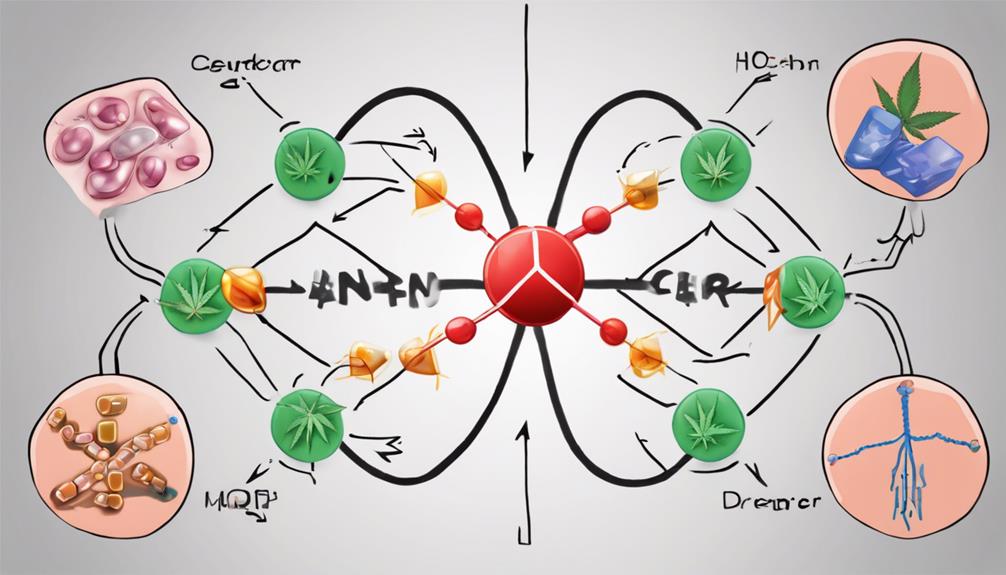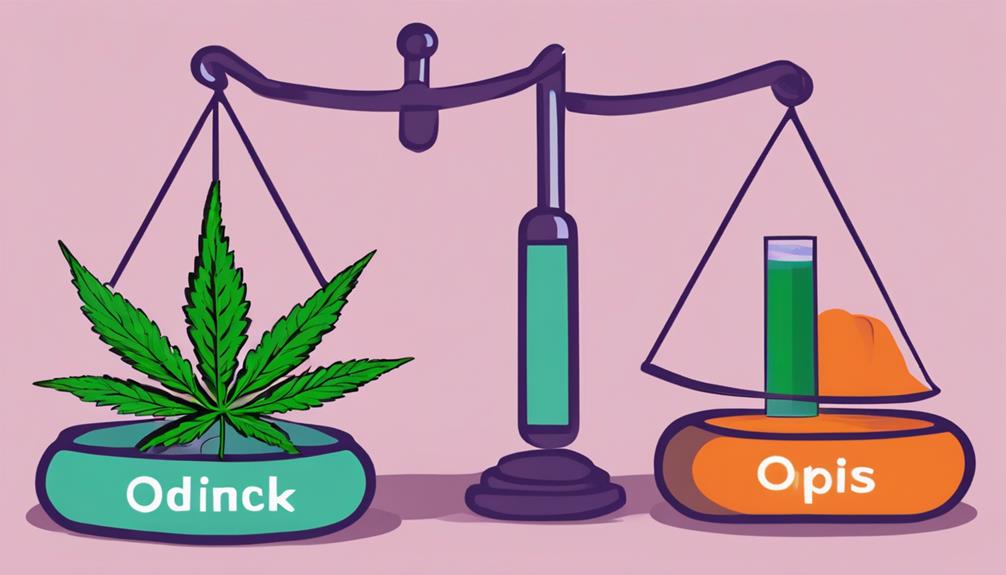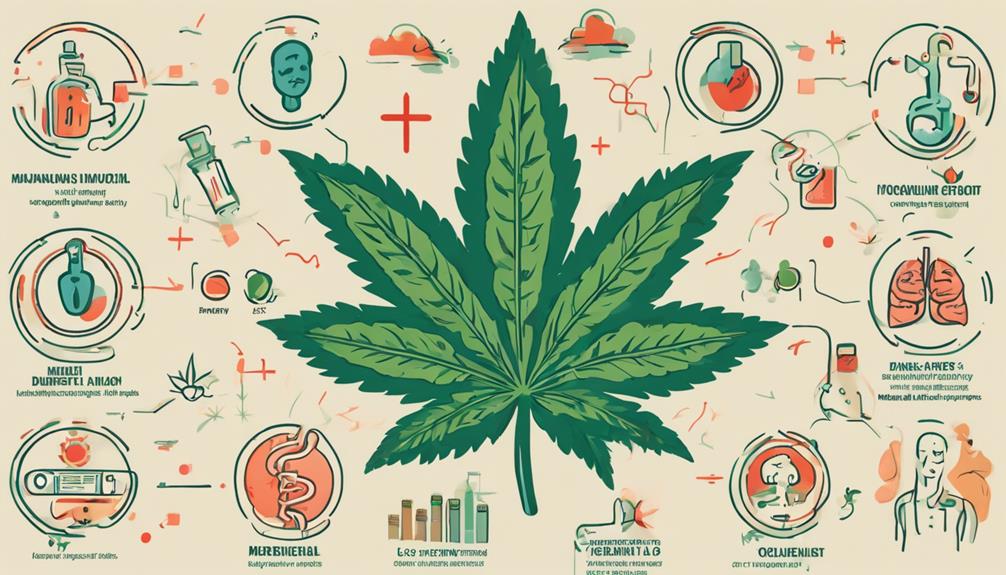Medical marijuana, with its unique blend of cannabinoids, can interact with your body’s endocannabinoid system to dampen pain signals in your brain. This not only targets the physical aspect of pain but also its emotional component, which traditional painkillers often overlook. Furthermore, medical marijuana poses less risk of addiction and overdose than opioids, providing a safer alternative for cancer patients. Could this be the future of effective, long-term pain management? We’re just beginning to uncover the true potential of medical marijuana in improving quality of life amidst cancer’s trials.
Understanding Cancer Pain

Coping with cancer pain is a challenge that no one should face alone. It’s crucial to understand the mechanisms involved in this type of pain to manage distressing symptoms effectively. Cancer-related discomfort varies from person to person and depends on the type and stage of cancer.
Typically, cancer pain results from the disease itself when a tumor presses on bones, nerves or organs causing discomfort. Such discomfort can also stem from treatments like chemotherapy or radiation therapy. As a caregiver or healthcare professional, understanding these mechanisms is essential for devising an appropriate symptom management plan.
Effective symptom management isn’t just about alleviating physical discomfort; it’s about addressing the emotional turmoil that accompanies it too. By helping patients understand their pain and validating their experiences while collaborating on treatment decisions – including considering options like medical marijuana – you can provide comfort and open up new avenues for relief.
In essence, it’s all about improving patient quality of life. By understanding the intricacies of cancer pain, you’re not just serving the patient; you’re empowering them in their fight against the disease.
Limitations of Traditional Painkillers
Despite their widespread use, traditional painkillers have limitations, especially when it comes to managing cancer pain.
Most conventional painkillers merely dull the perception of pain instead of addressing its root cause. This can lead to a vicious cycle where increasing dosages are required to keep the pain at bay, risking harmful side-effects and potential addiction.
Moreover, traditional painkillers often fail to provide comprehensive pain management. They might alleviate physical discomfort but emotional and psychological distress often remain untouched. These drugs may leave patients feeling detached and numb rather than offering true relief.
In addition, many conventional analgesics come with unpleasant side effects such as nausea, constipation and drowsiness which can further decrease quality of life. Furthermore, there’s always the looming threat of tolerance and dependence – a grim reality for many seeking relief from chronic pain.
An Introduction to Medical Marijuana

In your quest for effective cancer pain management solutions, you may have come across medical marijuana. It’s not a new concept but its potential therapeutic benefits are gaining recognition in the medical community.
Medical marijuana or medical cannabis is a plant-based medication derived from Cannabis sativa or Cannabis indica species. It has been used for centuries in traditional medicine but its use in modern medicine has been limited due to legal restrictions and stigma. However, the tide is turning and medical marijuana is now being acknowledged for its potential in pain management.
The therapeutic benefits of medical marijuana are attributed to its active components known as cannabinoids. The two most well-known cannabinoids are THC (tetrahydrocannabinol) and CBD (cannabidiol). THC is responsible for marijuana’s psychoactive effects while CBD offers numerous health benefits without the “high”.
Medical marijuana isn’t a one-size-fits-all solution. It’s essential to consult with a healthcare professional who can guide you on the appropriate dosage and method of administration. Remember, your goal is to alleviate pain and improve quality of life, and medical marijuana could be a viable option to help you achieve that.
The Science Behind Cannabis and Pain
To understand how cannabis can help with cancer pain, it’s important to delve into the science behind it. Our bodies house a complex system known as the endocannabinoid system – think of it as a network of messengers and receptors working together to maintain your body’s balance. When something’s off, like when experiencing pain, this system jumps into action.
So where does cannabis come in? Well, the compounds in cannabis – referred to as cannabinoids – are quite similar to the endocannabinoids your body naturally produces. When you use medical marijuana, these cannabinoids interact with your endocannabinoid system helping reduce pain and inflammation.
But how does this affect your perception of pain? Simply put, cannabinoids can inhibit the transmission of pain signals in your brain effectively altering your perception of discomfort. This is crucial when dealing with something as prevalent as cancer-related discomfort.
Understanding this science is important if you’re looking to offer holistic compassionate care. With medical marijuana, you’re not just alleviating physical discomfort – you’re offering an opportunity for better quality of life for those battling cancer.
Medical Marijuana Vs. Opioids

Balancing the pros and cons of medical marijuana and opioids can be quite a juggling act when it comes to managing cancer pain. You might feel torn between these two options, but let’s break it down together.
Opioids have been the traditional method of pain management in cancer patients. They’re effective, yes, but they carry serious side effects like addiction, overdose risk and severe constipation.
On the other hand, medical marijuana – an emerging alternative treatment – shows promise. Unlike opioids, it’s less addictive and doesn’t pose an overdose risk. Plus, it can address other symptoms like nausea and lack of appetite. However, it’s not without its own set of side effects including dizziness, dry mouth and potential cognitive changes.
In this battle between medical marijuana and opioids, your specific circumstances and needs must be taken into account. Consult with healthcare professionals who can guide you in making a well-informed choice. We’re in this together seeking the best possible options for your pain management with the goal to alleviate suffering without compromising overall health and wellbeing.
Patient Experiences With Cannabis
Let’s now examine some real-world experiences of patients who’ve used cannabis for cancer pain management. Patient testimonials reveal a profound appreciation for the benefits they’ve experienced from cannabis use.
For instance, one woman reported using cannabis as a last resort when traditional painkillers failed her. She found that cannabis not only alleviated her pain but also improved her mood and appetite, significantly enhancing her overall quality of life.
Similarly, a man in his mid-fifties with terminal lung cancer found solace in cannabis. According to him, the plant helped manage his pain effectively without the debilitating side effects he experienced with conventional opioids. His testimonial echoes the sentiments of many others who’ve found similar relief.
You’ll find numerous such stories – each one unique yet echoing a common theme: cannabis as a beacon of hope. As the medical community continues to explore this complex plant’s potential, these patient experiences are an invaluable part of the conversation. They serve as potent reminders of the real human impact of medical advancements and cannabis’s potential to improve lives for those dealing with cancer-related discomfort.
Risks and Side Effects of Medical Marijuana

Despite its potential benefits, medical marijuana use isn’t entirely devoid of risks. Like any medication, it carries potential risks and side effects that users should be aware of.
Short-term effects may include dizziness, dry mouth and altered mental states while long-term use might lead to cognitive impairment or dependency. It’s also important to remember that marijuana can interact with other medications potentially altering their effectiveness.
Efficacy studies are ongoing to better understand these risks and weigh them against the benefits. Current research suggests that for many patients, the advantages of pain relief outweigh potential drawbacks but more data is required for comprehensive understanding.
Even considering these risks it’s important to empathize with intense discomfort endured by cancer patients. However, this empathy shouldn’t eclipse the vital importance of safety. It’s crucial to understand these risks before deciding if medical marijuana is the right choice for you or someone you’re caring for.
Legal Aspects of Medical Marijuana
Navigating the legal terrain of medical marijuana can be challenging. Regulatory obstacles abound and public perception varies widely. Understanding this landscape is essential for those who aim to serve others.
As you navigate this terrain, you’ll likely encounter disparities between state and federal laws. While many states have legalized medical marijuana, it’s still classified as a Schedule I drug by the federal government meaning it’s considered illegal and without medicinal value at the federal level – a challenging contradiction that healthcare providers and patients must reckon with.
Public perception is another hurdle. While most Americans now favor legalization, there’s still a significant minority opposed to it whose voices can influence policy. This opposition often stems from misconceptions about medical marijuana’s safety and efficacy especially in treating cancer pain.
But don’t be disheartened. While these legal and societal hurdles can seem overwhelming they’re not insurmountable. By educating yourself and others advocating for change and remaining empathetic towards those who might oppose you can help shift the landscape in a more favorable direction with the ultimate goal being to provide best possible care for those suffering from cancer pain.
Future of Cannabis in Pain Management

The potential future role of cannabis in managing cancer pain is immense. With increasing legalization and changing societal attitudes, research opportunities are expanding. Scientists are delving deeper into the plant’s therapeutic properties and potential side effects.
Patients are increasingly shifting towards more natural alternatives and away from synthetic pharmaceuticals. This is where cannabis shines. Its natural compounds, particularly THC and CBD, have demonstrated significant pain-relieving effects. As a caregiver, this could provide you with a new tool in your arsenal – one that could potentially offer relief without the harsh side effects of traditional painkillers.
However promising this sounds it’s important to remember that research is still in its early stages. Approach this with an open mind but also with caution. Educate yourself about possible risks monitor patients closely and adjust treatment plans as necessary.
The future of cannabis in pain management is promising but complex. As part of the medical community your role in exploring this new frontier is essential. Engage in the conversation stay informed and most importantly listen to your patients.
Conclusion
You’ve explored why medical marijuana could be a game-changer for cancer pain treatment. According to a 2019 study 81% of patients found cannabis to be more effective than opioids highlighting its potential in pain management. Remember it’s not just about easing physical discomfort but also addressing emotional stress associated with battling cancer. Medical marijuana may indeed offer a safer more effective path to relief.
If you’d like to learn more we invite you to visit us at Fells Point Cannabis Docs of Maryland where our friendly team is always here to answer any questions you might have about medical marijuana and its benefits for managing cancer pain or call us at (410) 401-4200. We look forward to helping you explore safe and effective treatment options for your pain management needs.

